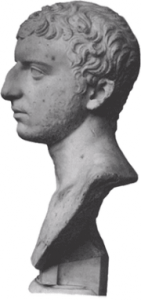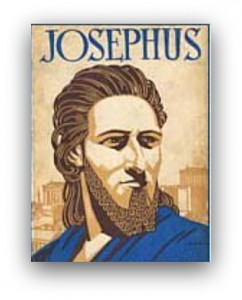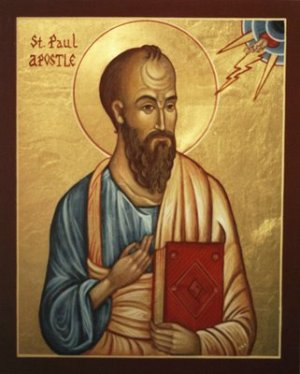
Artist’s Rendition of Machaerus
The translation in the Loeb edition of Josephus’ Antiquities 18.112 reads:
On his return after transacting his business in Rome, his wife, who had got wind of his compact with Herodias, before any information reached him that she had discovered everything, asked him to send her away to Machaerus, which was on the boundary between the territory of Aretas and that of Herod. She gave no hint, however, of her real purpose. Herod let her go, since he had no notion that the poor woman saw what was afoot. Some time earlier she herself had dispatched messengers to Machaerus, which was at that time subject to her father, so that when she arrived all preparations for her journey had been made by the governor. She was thus able to start for Arabia as soon as she arrived, being passed from one governor to the next as they provided transport. So she speedily reached her father and told him what Herod planned to do.
The footnote here says:
The reading of the mss. is “and to him who was subject to her father.”
The following notes are in the text here in the Loeb edition.
εἰς τὸν Μαχαιροῦντα τότε3 πατρὶ αὐτῆς ὑποτελῆ,4
3 τότε] ed. pr.: τῷ τε codd.
4 ed. pr.: ὑποτελεῖ codd.
The Neise edition simply reads, in agreement with the manuscripts:
εἰς τὸν Μαχαιροῦντα τῷ τε πατρὶ αὐτῆς ὑποτελεῖ
F. F. Bruce remarks in a footnote:
He appeals to the statement found in all the printed editions of Josephus, Ant. xviii 112, that Machaerus was subject to Aretas at the time of his daughter’s flight from Antipas (εἰς τὸν Μαχαιροῦντα τότε [τὸν τῷ Bekker] πατρὶ αὐτῆς ὑποτελῆ); but the manuscript tradition (εἰς τὸν Μαχαιροῦντα τῷ τε πατρὶ αὐτῆς ὑποτελεῖ) does not make this statement.
The reading of the printed texts and translations may be called a conjectural corruption of Josephus. Although it is to be found in the editio princeps of the Greek text of Josephus printed in 1544, it disagrees with the three extant manuscripts that attest to Antiquities 18 (AMW).
[Update May 2, 2015: The Latin version (and quotation of it) reads “apud Macherunta omnia pararentur quae itineris usus exposceret” and thus omits the phrase. A perceived inconcinnity in the original wording, “and to him who was subject to her father,” may explain this. On the other hand, if the original wording were the phrase “which was at that time subject to her father,” an omission by the Latin translators of the sixth century may be more difficult to explain. But if the original wording were the wording present in the Greek manuscripts, which could be considered a ‘difficult’ phrasing due to the oblique way of mentioning this person, both the omission in the Latin and the alteration in the Greek is explained.]
Continue reading »
 The study of the texts of Josephus, even in connection to the ‘hotly contested’ and famous passages found there, is not all wrangling. There is, it will be admitted, a slight amount of mystery as to whether a reference to Jesus originally formed part of the Latin table of contents (falling out of transmission here and there), or whether it came later and proliferated to most (but not all) of the Latin manuscripts. Aside from that, however, there is very little to tussle over here, with some interesting things to observe in the development of the textual witnesses, particularly in connection to the parts where John is mentioned.
The study of the texts of Josephus, even in connection to the ‘hotly contested’ and famous passages found there, is not all wrangling. There is, it will be admitted, a slight amount of mystery as to whether a reference to Jesus originally formed part of the Latin table of contents (falling out of transmission here and there), or whether it came later and proliferated to most (but not all) of the Latin manuscripts. Aside from that, however, there is very little to tussle over here, with some interesting things to observe in the development of the textual witnesses, particularly in connection to the parts where John is mentioned.


